
The laws which teach the children of Ya’oh-shar-al to separate from uncleanness so that they do not defile the tabernacle of YA’OH and die as a consequence are here set forth by Mashah and by his brother Ahran according to the commandment of YA’OH in Thorah 3 (aka Leviticus) 15:1-33. These laws are specifically for when the tabernacle of YA’OH is among us as per verse 31. However, we will learn to keep and do them now even without the tabernacle so that when we have built the tabernacle here in this second wilderness in the islands of the east we will already be doing these laws, and we will never ever defile His holy house. This is part of the work of our restoration and we embrace it with our whole heart.

[1] wA-yadabar YA’OH al Mashah wa-al Ahran la-amar
And spoke YA’OH to Mashah and to Ahran saying:
[2] dabaro al banay Ya’oh-shar-al wA-amartham al-ham aysh aysh chay yah’ayh zab ma-bashar-o zobo-o tam’ ho’
Speak to the children of Ya’oh-shar-al and say to them: Any man that he will be a flow – from his flesh is his flow – unclean is he.
[3] wa-za’ath thah’ayh tam’atho ba-zob-o rar bashar-o ath zob-o ‘o ha-khathaym bashar-o ma-zob-o tam’atho ho’a
and this will be his uncleanness in his flow: his flesh oozes his flow, or it was caused to be sealed his flesh from his flow, his uncleanness it is.
COMMENTARY OF THORAH 3.15:1-3
HA-ZAB (the one who flows):
[Verses 1-3] A man who has a zab (a flow) coming from his flesh is unclean. There are two types of unclean flows and both are caused by a bacterial infection. One type of zab is when the zab is oozing from his flesh, i.e. oozing skin infections, or a wound that is oozing pus, or weeping eczema. The second type of zab is when the zab is sealed off and the fluid is not issuing out from the flesh, i.e. pimples filled with pus, or an abscess filled with pus. Both types of zab make a person unclean.
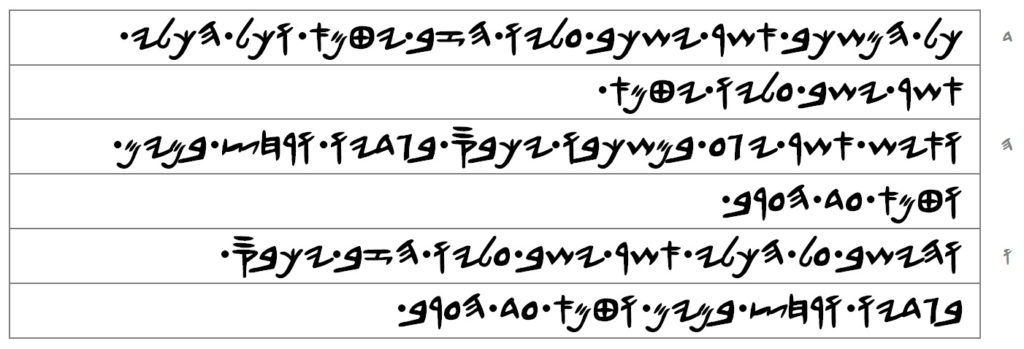
[4] chal ha-mashchab ashar yashachab ghalay-o ha-zab yatam’ wa-chal ha-chalay ashar yashab ghalay-o yatam’
all the bed which he will lie upon it, the one who flows, will be unclean; and all the vessel which he will sit upon it will be unclean.
[5] wa-aysh ashar yagai ba-mashchab-o yachabas bagaday’o wA-rakhats ba-maym wA-tam’ ghad ha-gharab
and a man who will touch on the bed of him will wash his clothes, and he will rinse in water, and he will be unclean unto the evening.
[6] wa-ha-yashab ghal ha-chalay ashar yashab ghalay’o ha-zab yachabas bagaday’o wA-rakhats ba-maym wA-tam’ ghad ha-gharab
and the one sitting upon the vessel which he will sit upon it, the one who flows, he will wash his clothes, and he will rinse in water, and he will be unclean unto the evening.
COMMENTARY OF THORAH 3.15:4-6
[Verse 4] The bed, and whatever is used for sitting, become unclean when the one who is the zab comes in contact with them.
[Verses 5-6] If anyone else touches the bed, or sits on what the unclean is using to sit upon, then he has to wash their clothes, and rinse their body off in water, and he will become clean again in the evening. The scripture says ghad ha-gharab (unto the evening) because that is how far the period of this particular uncleanness should last. In other words, if the uncleanness in question is contracted by a person in the evening then the person who contracted the uncleanness must wash his clothes and rinse his body in water and he is clean the same evening. He should not let the sun come out to start a new day before doing this or he misses his opportunity to become clean and remains unclean until his next opportunity in the evening of that new day. This is yet another proof from Thorah that a day begins in the morning.
Notice that the Thorah of YA’OH is not commanding that the bed and the vessel used for sitting must be washed and that afterwards they become clean in the evening.
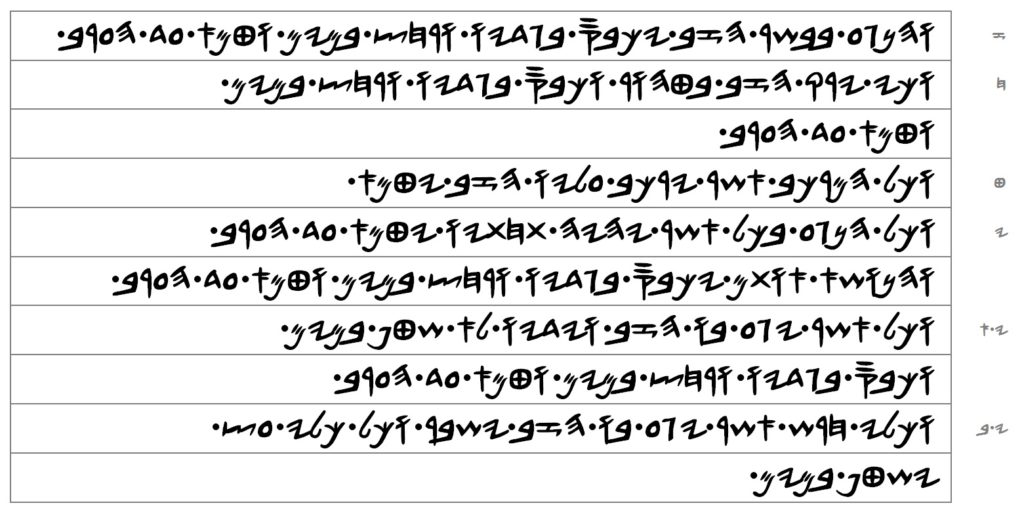
[7] wa-ha-nagai ba-bashar ha-zab yachabas bagaday’o wA-rakhats ba-maym wA-tam’ ghad ha-gharab
and the one who touches on the flesh of the one who flows, he will wash his clothes, and he will rinse in water, and he will be unclean unto the evening.
[8] wa-chay yarak ha-zab ba-tah’or wA-chabas bagaday’o wA-rakhats ba-maym wA-tam’ ghad ha-gharab
and if he spits, the one who flows, on the one who is clean, he will wash his clothes, and he will rinse in water, and he will be unclean unto the evening.
[9] wa-chal ha-marchab ashar yarachab ghalay’o ha-zab yatam’
and all the saddle which he will ride upon it, the one who flows, it will be unclean.
[10] wa-chal ha-nagai ba-chal ashar yah’ayh thakhathay’o yatam’ ghad ha-gharab wa-ha-nosh’ ‘otham yachabas bagaday’o wA-rakhats ba-maym wA-tam’ ghad ha-gharab
and everyone who touches in anything that will be under him, he will be unclean unto the evening; and the one carrying them, he will wash his clothes, and he will rinse in water, and he will be unclean unto the evening.
[11] wa-chal ashar yagai bo ha-zab wa-yaday’o la shatap ba-maym wA-chabas bagaday’o wA-rakhats ba-maym wA-tam’ ghad ha-gharab
and all who touch him, the one who flows, and his hands not did he overflow with water, he will wash his clothes, and he will rinse in water, and he will be unclean unto the evening.
[12] wa-chalay kharash ashar yagai bo ha-zab yAshabar wa-chal chalay ghats yAshatap ba-maym
and every earthen vessel which he will touch, the one who flows, it will be broken; and every vessel of wood will be overflown with water.
COMMENTARY OF THORAH 3.15:7-12
[Verse 7] The clean person who makes contact with the flesh of the zab needs to wash his clothes, and rinse his body in water, and he becomes clean in the evening. Again, if the uncleanness is contracted in the evening, then the clothes worn by the person and the person become clean that same evening when washed in water.
[Verse 8] If spit from a zab person comes in contact with a clean person, then the person needs to wash his clothes, and rinse his body in water, and he becomes clean in the evening. Again, if the uncleanness is contracted in the evening, then the clothes worn by the person and the person become clean that same evening when washed in water.
[Verse 9] The marchab (saddle) refers to the supportive structure for a rider of an animal, fastened to an animal’s back by a girth. If a zab touches it, then it becomes unclean.
[Verse 10] If any clean person touches anything that was sat on by the zab, then the person needs to wash his clothes, and rinse his body in water, and he becomes clean in the evening. Again, if the uncleanness is contracted in the evening, then the clothes worn by the person and the person become clean that same evening when washed in water.
[Verse 11] This law adds another detail to the instruction already given in verse 7. The person touching the flesh of the zab has to wash his clothes and rinse his body in water, and he becomes clean in the evening. In addition, he must also overflow his hands with water, not just his body, and if he neglects to do this then he has to wash his clothes and rinse his body in water all over again, and become clean in the evening.
[Verse 12] Earthen vessels (earthenware) is glazed or unglazed non-vitreous pottery clay that has normally been fired below 1,200 °C. Basic earthenware, often called terracotta, absorbs fluids such as water. However, earthenware can be made impervious to liquids by coating it with a glaze. The Thorah does not specify which type of earthen vessels are to be broken if a zab touches them. So we break them all if touched by a zab, glazed or not glazed, it doesn’t matter. On the other hand, vessels made of wood that are touched by a zab are to be overflown with water for re-use.
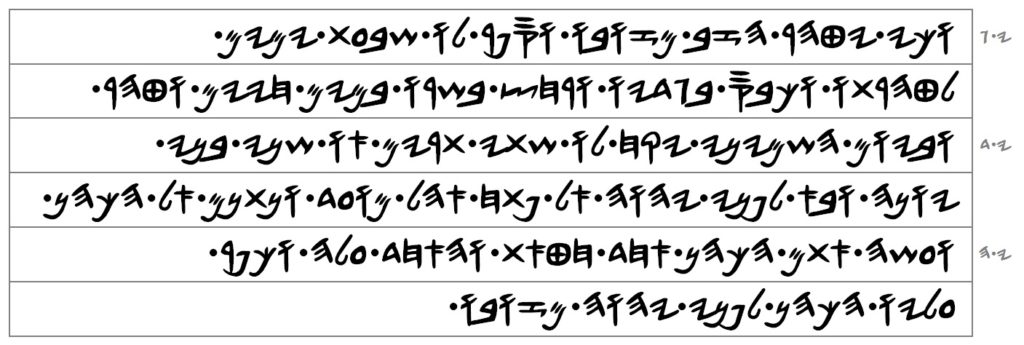
[13] wa-chay yatahr ha-zab ma-zob-o wA-sapar lo shabaith yamaym la-tahrath-o wA-chabas bagaday’o wA-rakhats bashar-o ba-maym khay’aym wA-tahr
and when he will be clean, the one who flows, from his flow, then he will count to himself seven consecutive days for his cleanliness, and he will wash his clothes, and he will rinse his flesh in living water, and he will be clean.
[14] wa-ba-yom ha-shamaynay yakakh lo shathay tharaym ‘o shanay banay yonah wa-ba’ la-panay YA’OH al pathakh ahl mo’aid wA-nathan-am al ha-chahn
and in the day of the eighth, he will take to him two turtle-doves or two young doves, and he will come before YA’OH to the door of the tabernacle of the appointed place, and he will give them to the priest
[15] wA-ghashah ath-am ha-chahn akhad khat’ath wa-akhad ghalah wA-chapar ghalay’o ha-chahn la-panay YA’OH ma-zob-o
and he will make them, the priest, one a sin offering, and one a burnt offering, and he will ransom upon him, the priest, before YA’OH, from his flow.
COMMENTARY OF THORAH 3.15:13-15
[Verse 13] When the zab is not flowing anymore, he is to count seven consecutives days from the day his flow was cleared up, then he washes in his clothes, and rinses his flesh in living water in the seventh day, and he is clean. The phrase maym khay’aym (living water) means running water, i.e. water that replenishes itself because it is constantly flowing and being replaced with new water. Such a water source can be a river, a spring, a water fall, or even a shower in your home.
[Verse 14] In the eighth day he will bring two turtle-doves or two young doves to the door of tabernacle and give them to the priest. No one is able to do this part of the law until the tabernacle is built here in the second wilderness. That means the zab and the one who becomes unclean from the zab remains unclean even after doing everything that the law is commanding in verses 1-13. As I said, we will do these laws anyway, even without the tabernacle, so that when we have built the tabernacle in this wilderness here in the islands of the east we will already be experts at doing them. We will not wait until the tabernacle is built before keeping the laws in verses 1-13 when they are already within our power to keep.
[Verse 15] The priest will take the two birds and make one a khat’ath (sin offering) and the other a ghalah (burnt offering), and he will ransom the person from his flow of uncleanness. Since both birds will be offered by the priest upon the altar of burnt offering, how is it that only one bird is called a ghalah (burnt offering)? They are both burnt offerings but one bird is being offered to ransom the person from errors made during his uncleanness. The khat’ath offering is for any of the procedures we have gone over in detail above that he was supposed to follow during the period of his zob, but he may have neglected to follow by accident. The law is merciful towards unintentional human error.
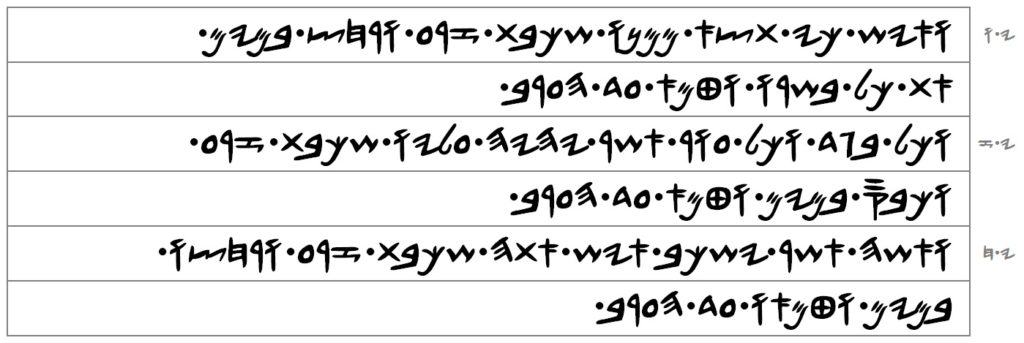
[16] wa-aysh chay thats’a ma-ma-no shachabath zarai wA-rakhats ba-maym ath chal bashar-o wA-tam’ ghad ha-gharab
and a man when it will come out from him lying down of seed, he will wash in water all his flesh, and he will be unclean unto the evening.
[17] wa-chal bagad wa-chal ghor ashar yah’ayh ghalay-o shachabath zarai wA-chAbas ba-maym wA-tam’ ghad ha-gharab
and every cloth and every skin which it will be upon it the lying down of seed, then it will be washed in water, and it will be unclean unto the evening.
[18] wa-ashah ashar yashachab aysh ath-ha shachabath zarai wA-rakhatso ba-maym wA-tam’a’o ghad ha-gharab
and a woman whom a man will lie down with her the lying down of seed, then they will wash in water, and they will be unclean unto the evening.
COMMENTARY OF THORAH 3.15:16-18
SHACHABATH ZARAI (lying down of seed)
[Verse 16] The next type of flow that makes a man unclean is whenever his shachabath zarai (lying down of seed), that is, his semen, comes out of him for any reason. He is to wash his entire body in water, and he will be unclean unto the evening. If his shachabath zarai comes out in the evening, then he becomes clean that same evening after he washes in water.
[Verse 17] Every bagad (cloth) and every ghor (skin) upon which his shachabath zarai is spilled on, it must be washed in water, and it will be unclean unto the evening. The word bagad includes the clothes that you wear and also a bed cloth or bed sheet (1 Sam. 19:13). Since clothes could be made from the ghor of an animal, such as leather, the law also commands that they too be washed if shachabath zarai is spilled onto them. Note that it is just the stained bagad or ghor itself that must be washed, not anything else that they come in contact with. The uncleanness of these items is not transferred.
[Verse 18] A man and his wife must wash after having sexual intercourse if shachabath zarai comes out of the man. They are both unclean unto the evening, but if they become unclean in the evening they can wash and become clean that same evening. They must not let the sun go out to start a new day without washing or they remain unclean until the next opportunity to become clean in the evening of that new day.
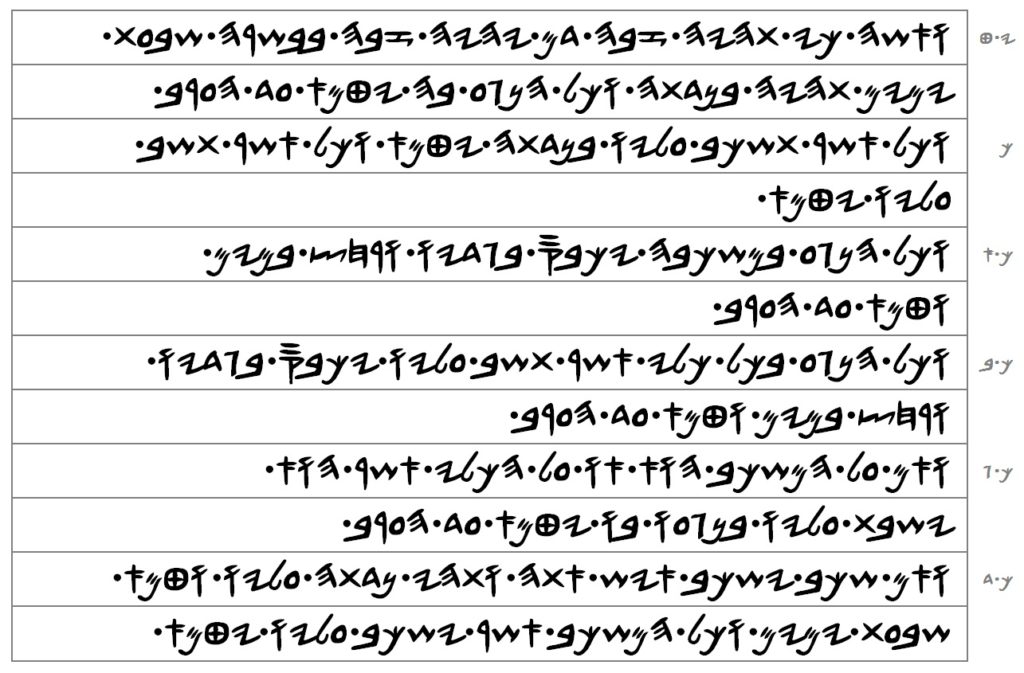
[19] wa-ashah chay thah’ayh zab-ha dam yah’ayh zab-ha ba-bashar-ha shabaith yamaym thah’ayh ba-nadath-ha wa-chal ha-nagai ba-ha yatam’ ghad ha-gharab
and a woman when blood will be her flow, it will be her flow in the flesh of her, seven consecutive days will she be in her isolation, and everyone who touches in her will be unclean unto the evening.
[20] wa-chal ashar thashachab ghalay-o ba-nadath-ha yatam’ wa-chal ashar thashab ghalay-o yatam’
and everything which she will lie upon it in her isolation will be unclean, and everything which she will sit upon it will be unclean.
[21] wa-chal ha-nagai ba-mashchab-ha yachabas bagaday’o wA-rakhats ba-maym wA-tam’ ha-gharab
and anyone who touches in the bed of her, he will wash his clothes, and he will rinse in water, and he will be unclean unto the evening.
[22] wa-chal ha-nagai ba-chal chalay ashar thashab ghalay’o yachabas bagaday’o wA-rakhats ba-maym wA-tam’ ghad ha-gharab
and anyone one who touches in any vessel which she will sit upon it, he will wash his clothes, and he will rinse in water, and he will be unclean unto the evening.
[23] wa-am ghal ha-mashchab ho’a ‘o ghal ha-chalay ashar ho’a yashabath ghalay’o ba-nagai-o bo yatam’ ghad ha-gharab
and if upon the bed it is or upon the vessel which she is the one sitting upon it, when he touches in it he will be unclean unto the evening.
[24] wa-am shachab yashachab aysh ath-ha wa-thah’ay nadath-ha ghalay’o wA-tam’ shabaith yamaym wa-chal ha-mashchab ashar yashachab ghalay’o yatam’
and if a man will insist to lie with her, and it will be her isolation upon him, then he will be unclean seven days, and all the bed which he will lie upon it will be unclean.
COMMENTARY OF THORAH 3.15:19-24
NADAH (isolation)
[Verse 19] The flow of a woman that makes her unclean is the flow of blood during her batholaym (menstrual cycles). She is a batholah if she is a menstruating female. When her period begins she is unclean and she is to be on her nadah (isolation) for seven consecutive days.
[Verse 20] Everything that she lies down upon or sits upon becomes unclean.
[Verse 21] Verse 20 just said everything she lies down upon becomes unclean and verse 21 specifies that anyone touching her bed becomes unclean can wash their clothes and rinse their body and become clean again in the evening. If uncleanness is contracted by touching her bed in the evening then the person who became unclean can wash their clothes and rinse their body and become clean in the same evening.
[Verse 22] Verse 20 just said everything she sits upon becomes unclean and verse 22 specifies that anyone touching a vessel she uses for sitting can wash their clothes and rinse their body and become clean again in the evening. If uncleanness is contracted by touching her vessel for sitting in the evening, then the person who became unclean can wash their clothes and rinse their body and become clean in the same evening.
[Verse 23] If the blood of her flow is upon the bed or upon any vessel she uses to sit on, if a person touches either he is unclean.
[Verse 24] If a man has an irresistible urge to have sex with his wife, but it is the time she is to be on her nadah, then he will be unclean for seven days just like her, and all of his bed will be unclean. Note that the law prohibits a man from intentionally sleeping with a woman who is on her nadah (Thorah 3.19:18), and it also condemns both of them to death if they intentionally have sex and her flow of menstrual blood is excessive (Thorah 3.20:18). Thus, verse 24 is a case where the man and his wife do not realize until after they have sex that her menstruation has started.
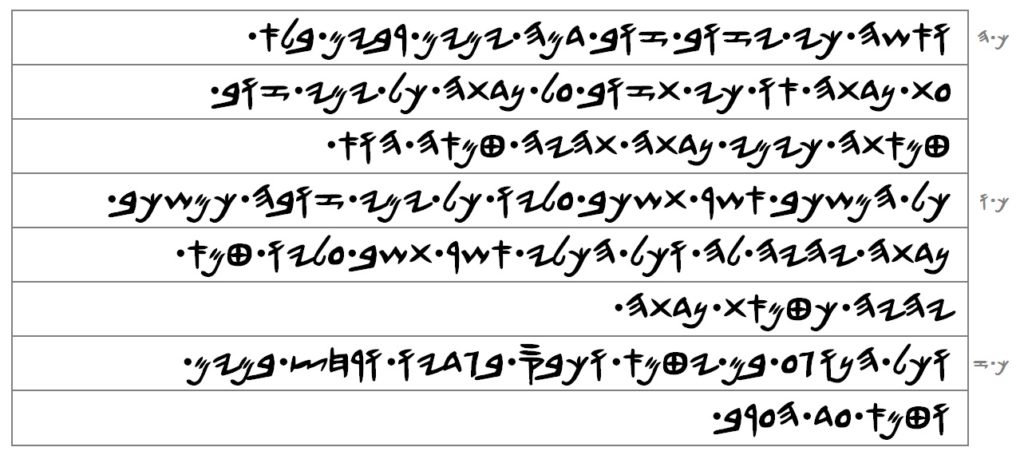
[25] wa-ashah chay yazob zob dam-ha yamaym rabaym ba-la’ ghath nadath-ha ‘o chay thazob ghal nadath-ha chal yamay zob tam’ath-ha cha-yamay nadath-ha thah’ayh tam’ah ho’a
and a woman if it will flow a flow of her blood many days that is not the time of her isolation, or when it will flow beyond her isolation, all the days of the flow is her uncleanness, like the days of her isolation it will be, unclean she is.
[26] chal ha-mashchab ashar thashachab ghalay’o chal yamay zob-ha cha-mashchab nadath-ha yah’ayh la-ha wa-chal ha-chalay ashar thashab ghalay’o tam’ yah’ayh cha-tam’ath nadath-ha
every bed which she will lie upon it all the days of her flow like the bed of her isolation will it be to her, and every vessel which she will sit upon it unclean it will be like the uncleanness of her isolation.
[27] chal ha-nogai bam yatam’ wA-chabas bagaday’o wA-rakhats ba-maym wA-tam’ ghad ha-gharab
everyone who touches in them will be unclean, and he will wash his clothes, and he will rinse in water, and he will be unclean unto the evening.
COMMENTARY OF THORAH 3.15:25-27
[Verse 25] If a woman has her flow of blood outside of the normal time expected and it lasts many days, or if her flow is on time and it extends beyond what her isolation is supposed to be, then all the days of her flow of blood make her unclean just like the regular days of her isolation. She is unclean the whole time.
[Verse 26-27] Every bed she lies upon and every vessel she sits upon will be unclean. Whoever touches them becomes unclean, and he must wash his clothes, and rinse in water, and be unclean unto the evening. The law is not saying that the bed and what she sits on must be washed. They are simply unclean during the time of her uncleanness, and they become clean when she becomes clean.

[28] wa-am tahrah ma-zob-ha wA-saparah la-ha shabaith yamaym wa-akhar thatahr
and if she is cleansed from her flow, then will she count to herself seven consecutive days, and after will she be clean.
[29] wa-ba-yom ha-shamaynay thakakh la-ha shathay tharaym ‘o shanay banay yonah wA-habay’ah ‘otham al ha-chahn al pathakh ahl mo’aid
and in the day of the eighth she will take to herself two turtle-doves, or two young doves, and she will cause them to be brought to the priest, to the door of the tabernacle of the appointed place.
[30] wa-ghashah ha-chahn ath ha-akhad khat’ath wa-ath ha-akhad ghalah wA-chapar ghalay-ha ha-chahn la-panay YA’OH ma-zob tam’ath-ha
and he will make, the priest, one a sin offering, and one a burnt offering, and he will ransom upon her, the priest, before YA’OH from the flow of her uncleanness.
COMMENTARY OF THORAH 3.15:28-30
[Verse 28-30] Verse 19 instructed us that the day a woman begins her flow of blood she is to be on her nadah for seven consecutive days. Now we learn that if her flow stops on or after the seventh day that she is to count another seven days from that point, and then on the eighth day bring two turtle-doves or two young doves to the priest at the door of the tabernacle. If her flow extends beyond the first seven days then the second counting of seven days will not start until the day her flow of blood stops. She is unclean the entire time she has a flow of blood and the second counting of seven days can only commence when her flow of blood has stopped.
As stated earlier, we cannot keep the part of the law regarding the offerings to be brought to priest at the tabernacle so that she can be ransomed from her flow until we have built the tabernacle. That means a woman remains unclean until YA’OH shows us mercy and allows us to build His tabernacle here in this second wilderness, and He will. We must first meet Him half way and do those parts of the law that are within our power to do now. He will honor our efforts to honor him (chay machbada’ay achabad, “for they that honor me will I honor” – 1 Sam. 2:30), and He will make up for what is lacking so that we can build His house, which is a commandment, and do the whole of His law as it was written by His servant Mashah.

[31] wa-hazartham ath banay Ya’oh-shar-al ma-tam’atham wa-la’ yamatho ba-tam’atham ba-tam’a-m ath mashchanay ashar bathoch-am
and you will cause to alienate the children of Ya’oh-shar-al from their uncleanness, and not will they die in their uncleanness when they defile my tabernacle which is among them.
[32] za’ath thorah ha-zab wa-ashar thats’a ma-ma-no shachabath zarai la-tam’ah ba-ha
This is the law of the one who flows, and who it will go forth from him lying down of seed, to defile him by it.
[33] wa-ha-doh ba-nadath-ha wa-ha-zab ath zob-o la-zachar wa-la-nakabah wa-la-aysh ashar yashachab gham tam’ah
and the infirm in her isolation, and the one who flows his flow, for male and for female, and for the man who will lie down with the unclean woman.
COMMENTARY OF THORAH 3.15:31-33
[Verse 31-33] wa-hazartham ath banay Ya’oh-shar-al ma-tam’atham (and you will cause to alienate the children of Ya’oh-shar-al from their uncleanness). When you are unclean you are to separate yourself from others who are clean. This much is clear but the laws are assuming there is a tabernacle. Keeping the tabernacle of YA’OH clean from defilement so that we do not die is the whole point behind these laws. No one is allowed to enter into the makhnah (camp), which has the tabernacle at the center of it, if they are unclean (Thorah 4.5:1-4; 5.23:10-11). This teaches us that the makhnah is not an area where the people have their homes and where they live regularly. You cannot even have toilets or urinals anywhere inside the area of the makhnah. Whenever mother nature calls you have to exit the makhnah because YA’OH is walking there in the midst of it, and no unclean thing must be seen by Him there or He will depart from it (Thorah 5.23:12-14). Thus, we long for the day when He is walking amongst us once again. May He hear us and see that our heart’s desire is to obey Him, and give us all that we need to build His holy house here in this second wilderness in these islands of the east speedily and ASAP.
His name is YA’OH
Always has been. Always will be.
#EXODUS2023
1.15.7252 (April 5, 2023)

Chan this reading is very very fun especially when you hear it in class also , it’s like solving a math problem, Thodah YA OH for the GHAYT
Very informative MABAYN GHAYT, our cultural way of life is so important for us to know, I’m glad that our ALA’AYM has given us a “Clean” insightful road of Pure Organic product (Scripture, language, bro and sis hood) of Positivity, instead of the world of the European caucus mountain nation of (Willy Lynch) lies and destruction unsavory rotteness products (Christianity, English, QJB, Jesus, rotating , rounded sphere Planet,) HALALO ATH YA’OH, AKH’AY SHALOM. Stay CLEANSED MASHPAKHATAY of YA’OHSHARALAY.